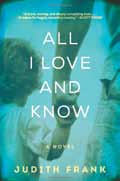Terrorism Induces Unexpected Parenthood
 It is, as reviewers have noted, a provocative premise: in the new novel All I Love and Know (HarperCollins, $26.99), the fallout from a Jerusalem suicide bombing ricochets through a family, setting numerous relationships off-balance and making everyone question roles, beliefs and responsibilities. The two main characters Judith Frank gives us are a pair of gay men who confront sudden and unexpected parenthood when they must adopt a niece and nephew orphaned in the bombing. What makes the premise of this book new and untried is that the two are grappling with their politics as well — about the Israeli/Palestinian conflict, of course, but also about their queer visibility in 2003.
It is, as reviewers have noted, a provocative premise: in the new novel All I Love and Know (HarperCollins, $26.99), the fallout from a Jerusalem suicide bombing ricochets through a family, setting numerous relationships off-balance and making everyone question roles, beliefs and responsibilities. The two main characters Judith Frank gives us are a pair of gay men who confront sudden and unexpected parenthood when they must adopt a niece and nephew orphaned in the bombing. What makes the premise of this book new and untried is that the two are grappling with their politics as well — about the Israeli/Palestinian conflict, of course, but also about their queer visibility in 2003.
While this narrative of two Israeli children adopted by their gay American uncles in the wake of their parents’ death from terrorism is indeed provocative, and while some of the issues it raises play out compellingly in its characters’ lives (what is the likelihood of a romantic relationship surviving sudden and horrific trauma?), the book, particularly in its first third, is marred by clumsy and overwrought politics. Matt, the non-Jewish boyfriend who wrestles with his place in the grieving family, doesn’t quite understand why it might not be appropriate for him to blurt out, “Wow. Is that occupied territory?” as he approaches Jerusalem for the first time. Similarly, though it may be entirely appropriate and right for authors to inject their own political leanings into a work of fiction, Frank seems not to notice that her constant comparisons of Israel to South Africa might not be a good fit for the circumstances in which she has placed her characters as they face momentous human loss and the genuine suffering that she has invented for them. In this case, the polemic feels unsuited to the story.
There is a lot going on in All I Love and Know, which perhaps accounts for some confusing errors in the narrative. (As an example, Frank accurately depicts Ethiopian security guards in front of popular cafés in Jerusalem, yet for one of the Israeli children adopted by the gay uncles, an African- American neighbor in Northampton is “the first brown person she’d ever talked to.”) Some subplots — like Matt’s troubled relationship with Jay, a close friend dead of AIDS — seem unnecessary. So much is happening already between Matt and his Jewish partner, Daniel. Daniel’s twin, Joel, was the young father killed along with his wife, Ilana, in the bombing. The custody battle between Daniel and Ilana’s religious, Holocaust-survivor parents is complicated by his homosexuality, portrayed, somewhat confusingly, as being more offensive in the Israeli legal system than in the American one.
The intense relationship between Daniel and Matt, and the inner grieving of six-year-old Gal, supply the most compelling parts of this book. Judith Frank has introduced new points of view for examining these complicated relationships, and she is to be commended for this. Yet All I Love and Know does, in the end, seem a fitting title for a book that leans heavily towards political sentiment, denying us better knowledge of the world in which it is set, and the characters the author brings to life.
Melanie Weiss is the Director of Education at Beth Israel Congregation of Waterville, Maine, and the Director of the Kadima Beth Hebrew School program at Temple Beth El in Portland, Maine. She is a Lilith contributing editor.


